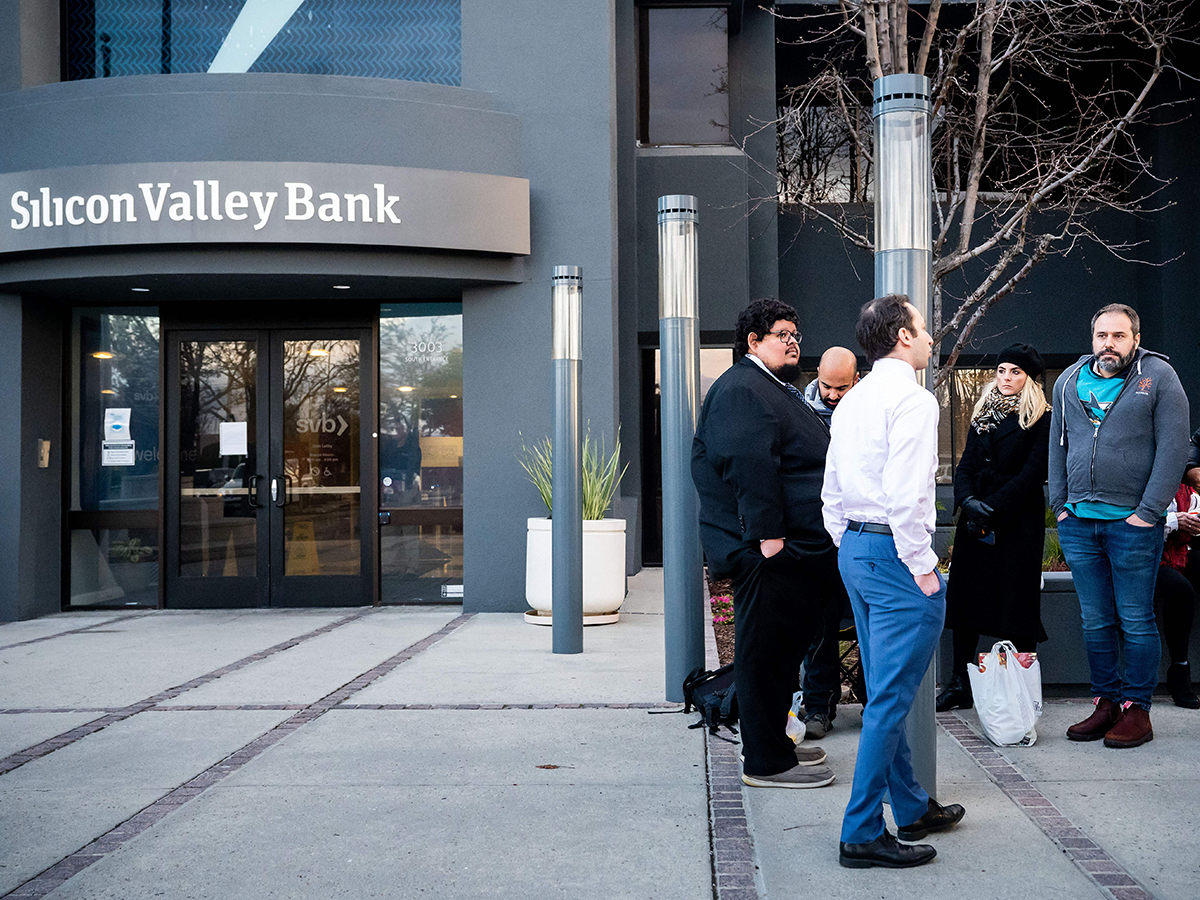What Does Silicon Valley Bank’s Collapse Mean for Canadians?

Update: On March 27, North Carolina-based First Citizens bank said it would buy much of the failed Silicon Valley Bank. The deal means First Citizens will assume US$110 billion in assets, deposits of US$56 billion and US$72 billion in loans from the failed SVB.
The collapse of Silicon Valley Bank, or SVB, earlier this month has been sending shockwaves throughout North America’s tech and banking industries. The lender, based in Santa Clara, Calif., had clients that included start-ups like HR and payment firm Rippling and major tech companies like Roku. It folded in March due to a bank run, making it the second-largest failure of a financial institution in U.S. history.
California regulators closed SVB on March 10 after the bank’s stock plummeted by 60 per cent in a single day, handing control over to the Federal Deposit Insurance Corporation (FDIC). The FDIC said all insured depositors will have full access to their funds, but the bank’s failure is causing anxiety north of the border with companies concerned that something similar could happen in Canada.
Here’s what you need to know about SVB’s collapse and what it means for Canada’s tech and banking sectors.
What caused SVB’s collapse?
The bank’s shutdown was triggered by a combination of rising interest rates, panicked clients and, reportedly, poor oversight and risky behaviour by the lender’s executive team. At the start of the pandemic, SVB was using depositors’ money to buy government-backed bonds—assets often considered “safe.” But as interest rates rose, those bonds lost value. SVB was sitting on more than US$17 billion in potential losses on those assets at the end of 2022, according to the Wall Street Journal.
In early March, SVB announced that it had sold a bunch of its securities portfolio at a loss to shore up its balance sheet. This news caused panic among VC firms. Realizing the bank was in a precarious situation, the VCs reportedly told start-ups to get their money out of SVB. Depositors panicked and started withdrawing mass amounts; SVB faced US$42 billion in withdrawal requests in one day. The lender had no way to pay out that cash, so regulators stepped in and shut the bank down.
What SVB’s collapse means for Canada’s start-up sector
SVB was a major resource for start-ups, as both a lender and an investor. The bank worked with companies in the U.S., U.K., China and Canada, among others. Eveline Adomait, an economics professor at the University of Guelph, predicts that companies with loans from other lenders should be unaffected by the loss of SVB, but new start-ups might struggle. Losing SVB as a lending option could cause the start-up space to cool with fewer companies able to secure the funding to get off the ground.
Canadian start-ups might feel the effects of the collapse when they try to raise capital. Many investors and VC firms—especially ones with exposure to start-ups affected by the bank’s failure—are on edge, and some aren’t looking to back additional ventures right now due to the shaky economic landscape. Patrick Lor, managing partner at Calgary-based Panache Ventures, told the Financial Post he’s concerned SVB’s demise will result in loss of confidence in the start-up sector and preoccupy entrepreneurs. “I think the last thing anybody thinks about is, ‘Is my bank going to fail?’ We haven’t had one of those in a while,” he told the outlet.
Investments had already started to drop in Canada prior to SVB’s failure, with companies raising $14 billion in 2021, down to $9.7 billion in 2022, according to data from funding tracker Briefed.in. Start-ups are often considered a risky investment, as 20 per cent fail in their first year and more than two-thirds never deliver a positive return to investors. “I think there’s going to be fewer lenders willing to lend to new start-ups,” Adomait says. “Unless someone comes along and creates a program for start-ups.”
Banks are a financing route, but interest rates have gone up since the rock-bottom rates of the pandemic, so it costs more to borrow. “You have to find a bank who’s willing to lend to you,” Adomait says. “Canadian banks are amazingly stable, and they don’t usually lend tons and tons of money to start-ups.”
What SVB’s collapse means if you work at a tech company
If you’re working in tech you don’t need to panic and start job hunting just yet. SVB’s collapse doesn’t mean there will be mass layoffs in Canada, according to experts. Benjamin Bergen, president of the Council of Canadian Innovators (CCI), says that few Canadian firms had deposits with SVB. And those that did have been granted access to their accounts by regulators, with the FDIC covering losses.
Bergen points out that prior to the collapse, the tech sector was already seeing a downturn with cuts at companies such as DeepMind and Meta. But despite this tightening of the belt, many Canadian start-ups are still hiring. “Finding highly skilled workers is still a challenge for our CCI member companies,” Bergen says. “There’s still a tremendous amount of jobs out there.”
For Canadians working at U.S. companies, whether they’re affected will depend on the company’s funding situation. Early-stage start-ups trying to generate revenue and secure funding may have to sell or shut down, while more established companies with funding and lines of credit from other investors and banks should have some runway. Some U.S. companies have been transparent about the financial issues they are facing with SVB’s collapse: Rippling’s CEO Parker Conrad liquidated US$130 million of the company’s own market funds so that its affected customers could meet their payrolls.
Even if a few American start-ups do go under, Bergen doesn’t expect U.S. workers to rush north in search of job stability. What will bring U.S. workers to Canada is a prospering tech sector, especially since remote work has changed the way tech companies hire. “It’s less about Canada versus the U.S.,” he says, “and more about whether you’re a successful candidate.” In other words, tech companies hire based on skills rather than nationality.
What SVB’s collapse means for Canadian banks
There was some panic in the aftermath of the SVB collapse, with Canada’s main stock index dropping 0.9 per cent as investors sold banking shares due to fear of contagion risk. But, the good news is, unlike SVB, there’s little chance a Canadian bank will crumble, says Adomait. This means start-ups that borrowed money from local institutions shouldn’t fret. Canadian banks invest in financial derivatives, which are investments that tend to be less affected by interest and exchange rates. The banks don’t make a lot of money off these investments, but they also don’t lose a lot of money, either.
Plus, Adomait says that none of Canada’s six major banks focus on only one part of the economy. They have depositors from a variety of industries, meaning if one sector tanks, the bank will remain stable. Bergen agrees. “Canadian banks are so large and you have so many different deposit holders that the idea of them all simultaneously pulling up their money and leaving in one go is just unlikely,” he says.
In response to SVB’s collapse, Canada’s Office of the Superintendent of Financial Institutions (OSFI), which regulates banks, took over SVB’s Toronto branch. SVB operated in Canada as a foreign bank branch under OSFI’s supervision, and per its rules, did not hold deposits from Canadians, as reported by the Financial Post.
“It is important to note that the issues experienced by Silicon Valley Bank are unique to this institution,” a spokesperson for the regulator said in an email, explaining that OSFI has rules in place that require institutions to maintain an adequate level of capital and liquidity to help protect against significant periods of economic stress.
“Canadians can be confident that OSFI is always working diligently behind the scenes, making decisions and taking actions to protect depositors and creditors.”









